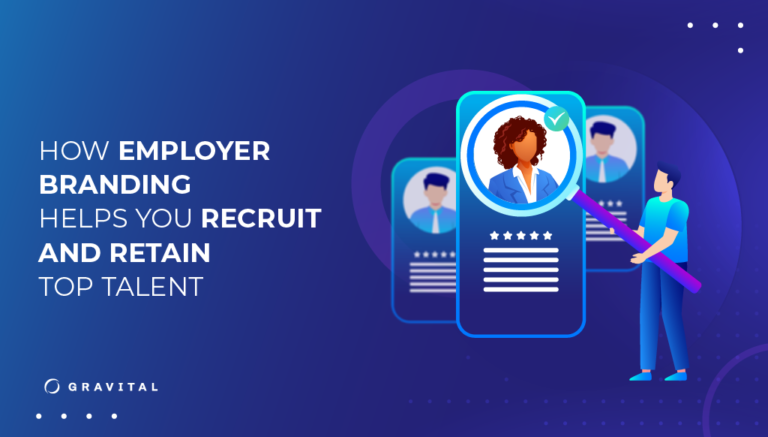Every company has an employer brand, whether it knows it or not. An employer brand is an inevitable consequence of the values and actions of a company, a reputation it builds among employees and job seekers.
A strong employer brand can attract, engage and retain top talent and increase employee productivity, loyalty and satisfaction. And what business doesn’t want that?
Key Insight
Here’s a fact every chief people officer, people ops executive, human resources director, recruiter and hiring manager should know and keep top of mind: 75% to 86% of job seekers research an employer’s reputation and consider employer brand before applying for a job.
Since you have an employer brand, you should have a say in it and not leave it to chance. Proactivity pays off. With some sound employer branding strategies, you can boost your employer brand and supercharge your recruiting efforts.
Employer Brand and Branding
An employer brand is different from a corporate brand. Instead of customers, it involves what employees–former, current and potential–think about your company and what it’s like working for you.
A strong employer brand gives employees a sense of identity and belonging. It establishes a common purpose, promotes collaboration, and encourages forward-thinking. It makes employees feel good about coming to work and using their skills to help their company succeed. This contentment trickles down to the customers, which is good business.
Employer branding is the process of promoting a company as the employer of choice to a desired target group, usually current and potential employees, in an effort to recruit and retain them. It is a powerful marketing tool that should not be neglected.
Through employer branding, a company communicates its employer value proposition, identity, culture, values, employee experience, and overall reputation. A strong employer brand conveys what it’s like to work at the company, what the company stands for, and what employees can expect in terms of culture, growth and benefits.

What is an Employer Value Proposition?
An employer value proposition (EVP) is a concise statement that describes what your company offers to employees in exchange for their skills, experience and capabilities. It encompasses elements such as corporate culture, career development opportunities, compensation and benefits, and work-life balance. A well-articulated EVP gives job seekers a powerful reason to work for you over your competitors, thus attracting candidates whose values align with the company’s, ensuring a good fit.
An EVP is an employee-centered approach that has been developed and tested with existing employees. Accordingly, it should include the aspects of your employer brand that enticed your team members to join your company and that continually makes them stay.
When creating an EVP, consider incorporating the following elements:
- Company mission, vision, values and culture
- Compensation
- Employee benefits and perks
- Career development
- Job security
- Work-life balance
- Flexible work options
- Remote work opportunities
- Commitment to diversity, inclusion and equity
- Employee recognition
- Social responsibility
- Opportunities for travel and client exposure
Benefits of Employer Branding
Engaging in employer branding has numerous benefits. Here are some of them:
Attracts More Qualified Candidates
When you project a positive and appealing image, you naturally draw in more interested individuals.
Improves Candidate Quality
A well-established employer brand attracts not just more candidates but more qualified ones. It makes the company more visible and appealing to a higher caliber of applicants.
Reduces Hiring Costs
Companies with a positive employer brand often spend less on recruitment efforts as their brand itself drives candidate interest. In other words, by attracting the right candidates, you spend less time and resources on recruitment efforts.
Boosts Employee Retention
When employees are aligned with the company’s values and culture, they’re more likely to remain engaged and loyal, reducing turnover rates.
Enhances Company Reputation
A positive employer brand strengthens the overall reputation of the company, making it more appealing not just to potential employees but also to customers and stakeholders. Successful candidates are more likely to not apply or reject an offer from a company who has a poor employer brand.

15 Strategies for Crafting and Improving Your Employer Brand
As with all branding, good storytelling is essential for building a strong employer brand. You need to use specific messaging to help attract and retain the talent you want on your team. At the same time, you need to walk the talk. Your employer brand must be true to the essence of your company so that current and potential employees know what to expect from you.
Here are 15 strategies to help you craft and polish your employer brand:
1. Conduct an Internal Audit
Analyze employee experience and company culture in your organization. Get familiar with how your company is viewed by employees and candidates. Consider using surveys, tracking your brand on social media, and employing a reputation monitoring firm to conduct research both internally and externally.
2. Define and Promote Your EVP
Draft an EVP that clearly communicates the values of your brand and what’s special about working at your organization. Your employer brand should align with your consumer brand but speak directly to candidates and employees. Use a variety of channels to spread the word.
3. Showcase Your Culture
Actively showcase your company culture through social media, company websites and other channels to attract potential candidates. Share employee testimonials, company culture initiatives, benefits, perks, and success stories to bring your brand to life.
4. Highlight Growth Opportunities
Clearly articulate opportunities for skills development, career advancement and ongoing learning to help attract employees who are committed to your company values and their personal and professional growth. Show your commitment to employee development by offering training, mentorship programs and other growth opportunities.
5. Foster a Positive Work Environment
A positive work environment is an extremely important selling point. Highlight benefits such as flexible work arrangements, opportunities for growth, a collaborative atmosphere and a supportive management team. Present your work environment through employee stories, office tours and day-in-the-life videos.
6. Recognize and Reward Performance
Celebrate your employees’ achievements and contributions. Empower managers to give small monetary rewards for outstanding performance and/or celebrate the successes of individuals publicly to help them feel appreciated for their efforts.
7. Communicate Transparently
Be transparent about company news, changes and goals. When employees feel informed and included in their company’s reputation and decision making, they’re more likely to trust the company’s leadership and remain engaged.
8. Commit to Employee Well-Being
Declare and show your organization’s commitment to employee well-being, including mental and physical health initiatives, work-life balance and a supportive workplace culture.
9. Leverage Content Marketing
Use content marketing to share real stories and testimonials from existing employees to provide insights into what it’s like to work for your organization. Positive testimonials and success stories on your website and social media builds credibility and attracts like-minded individuals.
10. Provide a Consistent Experience
Your employer branding should accurately reflect your employee experience from recruitment to long-term employment. When their experiences align with your EVP, employees are more likely to be satisfied and stay with the company.

11. Create a Referral Program
Encourage current employees to refer qualified candidates who align with your company’s values and environment. Make it easy for employees to share roles with friends via social media by providing short, catchy job descriptions on your own pages with clear links to share.
12. Promote Employee Advocacy
Ask your employees to share their experiences and stories. Employee advocacy can be a powerful tool in portraying an authentic image of what it’s like to work at your company. Consider establishing an employee advocacy program.
13. Test and Measure Employer Branding
To make sure your employer branding is effective, track and measure key performance indicators (KPIs) such as hiring rates, cost per hire, time to fill, quality of hire, offer acceptance rate, source of hire, application rate, retention rate and employee satisfaction.
14. Review and Update Your EVP
As your company evolves, so should your EVP. Regularly reviewing and updating your EVP ensures it remains relevant and appealing to current and prospective employees. Regularly track your employer brand perception through surveys and online reviews, and adapt your strategies accordingly.
15. Engage in Community Building
Participate in community events and initiatives. This not only improves brand perception but also demonstrates corporate social responsibility.
Final Words
Employer branding is a critical component in talent acquisition and retention. It transcends the traditional approach of merely offering employment to design and build a brand that resonates with current and prospective employees. By carefully crafting and maintaining a strong employer brand, companies can position themselves not just as a place to work, but as an employer of choice.
Ready to unlock the full potential of your employer brand? Talk to us today and discover how we can help you recruit and retain top talent to drive your business forward.


